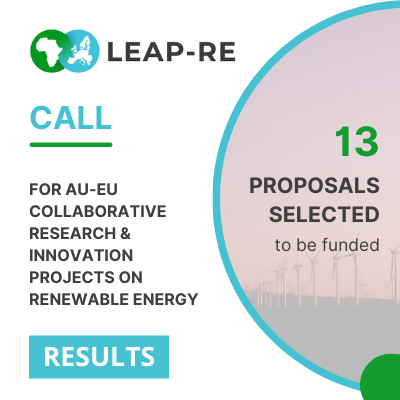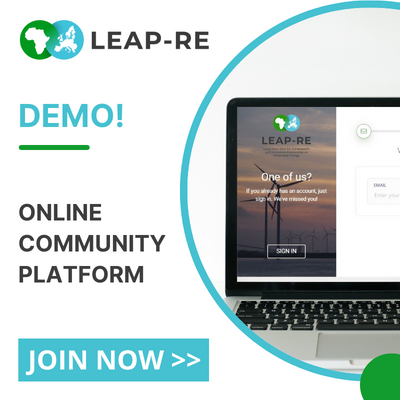In January 2021, LEAP-RE launched a ‘Call for AU-EU Collaborative Research and Innovation projects on Renewable Energy’. The Call resulted in 124 applications being received from candidates including compagnies, non-profit associations, research labs, foundations and more from 38 African and European countries. 36 pre-proposals were pre-selected, 32 were submitted, and 13 proposals were finally selected for funding.
The 13 proposals were chosen after a year-long selection process, involving an international review panel and a coalition of funding agencies from within the LEAP-RE consortium. By selecting these project proposals for funding, LEAP-RE strengthens its support to the development of renewable energy sources in order to address both climate change and the need for electrification, two of the biggest challenges Africa faces today.
Within its ‘Pillar 1’, LEAP-RE implements transnational proposals for research, innovation and capacity building that are co-funded by 16 African and European national funding organisations members of the LEAP-RE consortium, and the European Comission. The objective is to fund basic research, applied research and experimental development.
13 proposals selected for funding were chosen along 6 thematic lines
(The projects listed below are recommended for funding to the national/regional research funding organisations of LEAP-RE by the Pillar 1 Call 2021 Steering Committee. IMPORTANT: The actual funding of the projects depends on the successful completion of the contract negotiations at the national/regional level.)
1. Renewable energy resources, mapping and modelling
- OASES: Development and Demonstration of a Sustainable Open Access AU-EU Ecosystem for Energy System Modelling. Coordination: Fraunhofer Institute for Energy Economics and Energy System Technology, Germany.
2. End‐of‐life and second‐life management of RE components
- RESTART: REcycling of spent Li-ion batteries and end-life photovoltaic panels: From the development of metal recovery processes to the implementation of a START-up. Coordination: University UCA of Morocco, Morocco.
- SIREVIVAL: Si-based devices for renewable energy: From end of life recycling to revival of photovoltaic modules. Coordination: Université catholique de Louvain, Belgium.
3. Clean cooking and biomass transformation
- SoCoNexGen: Solar Indoor Cooking Systems of the Next Generation. Coordination: Aachen University of Applied Sciences, Germany.
- SOLAR INDUCE: SOLAR INDUCEed domestic clean efficient cooking and refrigeration for off-grid applications in Africa. Coordination: COPRECI S Coop, Spain.
- PyroBioFuel: Sustainable biomass conversion into bioenergy through pyrolysis. Coordination: Cairo University, Egypt.
- SunGari: A modern solar cooking solution for African staples. Coordination: University of Greenwich, UK.
4. New renewable energy resources for Africa
- HyAfrica: Towards a next generation renewable energy source – a natural hydrogen solution for power supply in Africa. Coordination: CONVERGE, Lda, Portugal.
5. New, more efficient PV cells and components
- QDSOC: Environmentally friendly colloidal quantum dots for high performance solar cells. Coordination: Université de Lorraine, France.
- NANOSOLARCELL: Integration of photonic conversion layers based on photoemissive nanostructured materials for improving sunlight harvesting ability of solar cells. Coordination: CNRS-CEMHTI, France.
6. Productive uses and new applications of solar energy
- MG-FARM: Smart stand-alone micro-grids as a solution for agriculture farms electrification. Coordination: Université de Lorraine, France.
- LEDSOL: Enabling clean and sustainable water through smart UV/LED disinfection and SOLar energy utilization. Coordination: Centrul IT pentru Stiinta si Tehnologie, Romania.
- SolChargE: Decentralized Solar Charging System for Sustainable Mobility in rural Africa. Coordination: Technical University of Munich, Germany.
Selected project proposals will receive a global funding of €10.35 million. They include a total of 83 partners from 8 European countries (Belgium, France, Finland, Germany, Portugal, Romania, Spain, UK) and 9 African countries (Algeria, Egypt, Ethiopia, Morocco, Mozambique, Nigeria, South Africa, Togo, Tunisia).




